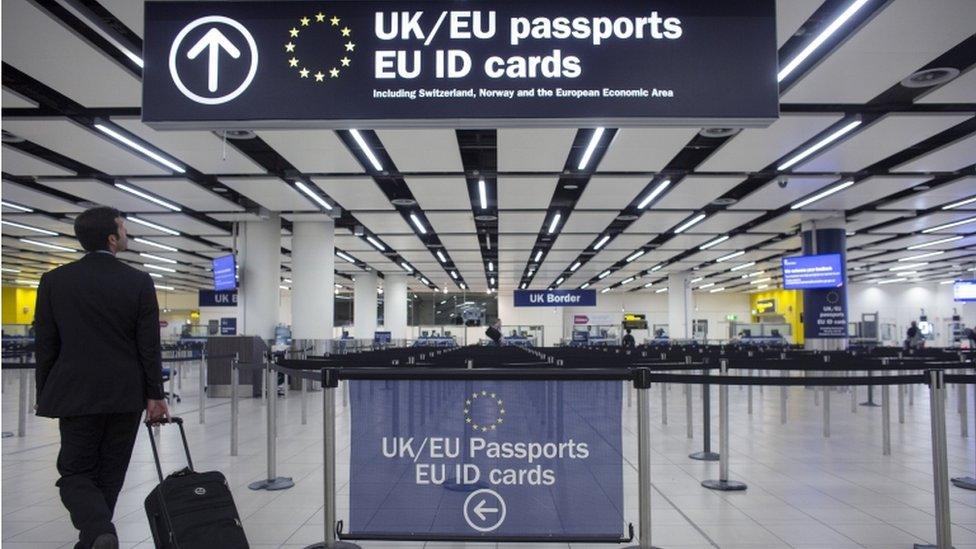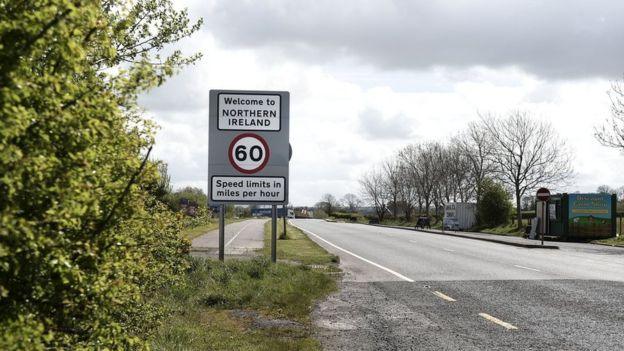Brexit: EU migration rules 'to end straight after no-deal'
- Published
- comments

The UK government has said EU free movement rules will end immediately if there is a no-deal Brexit on 31 October.
Theresa May had considered phasing out the rules if the UK leaves the EU without an agreement, but those plans have now been dropped.
The change would affect the rights of EU citizens who arrive in the UK from November onwards.
A Lib Dem MP has criticised the move as "irresponsible and reckless".
Under Mrs May, two options had been considered to prolong the rules, which allow EU nationals to live and work freely in other countries in the bloc, under no deal.
One option was for the rules to be extended until January 2021, and another was to allow EU citizens to stay for three months before applying for a longer stay.
Those plans have been dropped by Prime Minister Boris Johnson, in favour of a new approach to be set out at a later stage.
Speaking on Monday, Mr Johnson said the UK would not "become hostile to immigration," but it would be "democratically controlled" after Brexit.
The Home Office said EU citizens currently living in the UK would still have until December 2020 to apply for the right to remain under its settled status scheme.
"Freedom of movement as it currently stands will end on 31 October when the UK leaves the EU, a spokesperson said.
"After Brexit the government will introduce a new, fairer immigration system that prioritises skills and what people can contribute to the UK, rather than where they come from."
A Downing Street spokeswoman added that "tougher criminality rules" for those coming to the UK will be introduced.
Under the withdrawal agreement, negotiated with the EU by former Prime Minister Mrs May, freedom of movement would have stayed for a two-year transition period.
However, MPs repeatedly voted down Mrs May's deal and unless an agreement can be reached the UK will leave without a deal on 31 October.
Mr Johnson has said he wants to reach a new agreement with the EU but is willing to leave without a deal if one cannot be agreed.
Who will be affected?
In a no-deal scenario, those EU citizens with the right to permanent residence in the UK - which is granted after they have lived in the UK for five years - should not see their rights affected.
EU nationals who are already in the UK can apply for settled status or pre-settled status in the same way as now.
An end to freedom of movement would not affect those EU citizens coming for holidays and short trips, but would impact those who wish to work or study in the UK.
The changes to freedom of movement will not directly affect Irish citizens.
In May, British and Irish ministers signed a deal to guarantee free movement for their citizens crossing the Irish border and cross-border access for study and health care.
What has been the reaction?
Conservative MP Alberto Costa, who has campaigned on the issue, described the government's announcement as "a deeply concerning move" and criticised "a total lack of clarity".
He also warned: "What we do with EU nationals post-Brexit will be mirrored by EU states towards British citizens in the EU.
"If the British government abruptly terminates the legal arrangements in respect of citizens it will directly negatively impact on innocent British citizens working in the EU."
Lib Dem home affairs spokesman Sir Ed Davey accused the government of being "irresponsible and reckless".
He said "employers up and down the country won't know what the law is", adding "this will hugely increase the damage cause by a no-deal Brexit".
The 3million group, which campaigns for the rights of EU citizens living in the UK, said ending free movement without putting legal provisions in place for those who have not applied under the settled status scheme "will mean that millions of lawful citizens will have their legal status removed overnight".
Director of the Migration Observatory, Madeleine Sumption, said ending freedom of movement could "simply mean ending the role of EU law in governing the rights of EU citizens here and replacing it with UK law".
But she said it could also mean introducing a new "substantially more restrictive" system.
She said it would be "quite difficult" to enforce any new rules before the process of registering those EU citizens who have already been living in the UK for years has been completed.
Can the government drop freedom of movement?
As it stands, the policy of freedom of movement will automatically transfer into UK law on exit day as stipulated in the Withdrawal Act.
Ministers can change some regulations by statutory instrument - a form of secondary legislation, external - but only to address "deficiencies".
This is why the government needed to introduce the Immigration Bill, the first clause of which ends freedom of movement.
But this has been shelved - partly to avoid it being used by rebels to take control of parliament - and is unlikely to be passed before exit day.
BBC home affairs correspondent Danny Shaw said the logistics of the new scheme still had to be worked out.
"You've got to remember this: 40 million people arrive from the EU - EU nationals - every year into the UK," he said.
"So for the ports and airports that will mean enhanced checks if freedom of movement rules are abolished straightaway and that will put quite a burden on the staff working at Britain's ports and airports."
- Published7 August 2019

- Published8 May 2019

